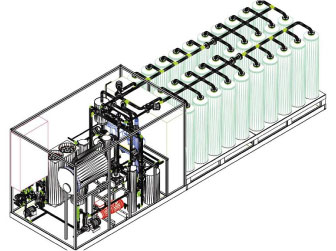Efficiency Enhances Via the Transformer Oil Regeneration Process
Wiki Article
Why Regenerated Transformer Oil Is Important for Reliable Power Solutions
The crucial duty of regenerated transformer oil in making sure the dependability of power systems can not be overstated. By bring back the oil's inherent chemical and physical homes, the regrowth process significantly improves its dielectric stamina and thermal performance.Significance of Transformer Oil
Transformer oil plays a critical role in the efficient operation of electrical transformers. By providing thermal conductivity, transformer oil dissipates warm generated during electric procedure, which is crucial for maintaining ideal operating temperature levels and prolonging the life expectancy of the equipment.Moreover, transformer oil acts as an obstacle versus wetness and air, which can result in oxidation and degradation of transformer products. The visibility of pollutants in the oil can considerably impair its protecting buildings, resulting in functional ineffectiveness and prospective equipment failing. Normal tracking and upkeep of transformer oil are consequently important to making certain the continued effectiveness of transformers.
The top quality and structure of transformer oil are critical, as they directly influence the dependability and performance of the electric systems in which they operate. Understanding the relevance of transformer oil is essential for markets and utilities reliant on durable power infrastructure, emphasizing the requirement for effective monitoring and regeneration procedures to preserve oil integrity with time.
Benefits of Regrowth Refine

Furthermore, the regrowth procedure minimizes the degradation of oil, which can result in enhanced oxidation and acid development. This not just improves the integrity of the oil but likewise reduces the danger of transformer failings due to insulation break down. The improved high quality of regrowed oil enables transformers to operate at optimal levels, ultimately resulting in enhanced energy efficiency and reduced operational prices.
In addition, the regrowth procedure adds to keeping the total wellness of the power system. Transformers can run much longer without the need for oil replacement, therefore lessening downtime and maintenance initiatives. In recap, the regeneration process offers substantial benefits by boosting the durability and efficiency of transformer oil, ensuring that power systems operate dependably and effectively in time.
Ecological Effect and Sustainability
The regeneration procedure of transformer oil dramatically alleviates ecological concerns related to oil disposal and waste management. Conventional disposal approaches for used transformer oil position considerable dangers, including soil contamination and water air pollution. By restoring oil, these threats are considerably reduced, as the procedure reuses existing sources rather than adding to throw away buildup.Additionally, regenerated transformer oil can be reused in various applications, which advertises a round economic climate. This not just lessens the requirement for virgin oil extraction-- a procedure that can be environmentally destructive-- but additionally conserves all-natural resources. The regrowth process itself utilizes innovative filtering and filtration techniques that get rid of damaging contaminants, making sure that the end product fulfills or exceeds market standards for performance and safety and security.

Enhancing Transformer Efficiency
Considerable renovations in transformer efficiency can be achieved with the usage of regenerated transformer oil. This oil, generated through sophisticated filtration procedures, significantly improves the electric insulation residential or commercial properties of transformers. By getting rid of contaminations and pollutants that typically endanger performance, regenerated oil makes certain exceptional dielectric stamina, minimizing the threat of electric failings.In addition, regenerated transformer oil displays improved thermal conductivity, which assists in effective warm dissipation. This particular is vital for preserving ideal operating temperatures, thus extending the life-span of transformers and minimizing the likelihood of getting too hot - Regenerated Transformer Oil. Improved thermal monitoring additionally adds to the general dependability of power systems
Furthermore, the chemical stability of restored oil protects against the development of destructive acids and sludge, which can negatively affect transformer components. By maintaining a Regenerated Transformer Oil cleaner internal setting, this oil decreases maintenance demands and expands solution intervals.
Cost-Effectiveness and Efficiency
In terms of cost-effectiveness and performance, regenerated transformer oil presents a compelling option to traditional oils. The regeneration process not only gets rid of impurities yet additionally brings back the oil's original buildings, expanding its practical lifespan. This long life equates right into reduced regularity of oil replacement, consequently reducing functional expenses over time.
Additionally, using restored oil can substantially decrease power losses associated with inefficient shielding fluids. Its remarkable dielectric properties make sure optimal performance, improving the reliability of power systems. As an outcome, businesses gain from reduced upkeep costs and reduced downtime, cultivating a more effective functional atmosphere.

Verdict
Finally, the regrowth of transformer oil plays a crucial function in making sure the dependability and performance of power systems. By bring back the essential chemical and physical residential properties of the oil, this process enhances dielectric toughness and thermal conductivity, inevitably minimizing the risk of insulation malfunction. Furthermore, the environmental advantages related to reusing sources add to sustainability initiatives, while cost-effectiveness and enhanced performance highlight the necessity of making use of regenerated transformer oil in contemporary electric facilities.Transformer oil plays a crucial function in the efficient operation of electric transformers. Regular surveillance and upkeep of transformer oil are consequently crucial to ensuring the continued effectiveness of transformers.
The regeneration procedure of transformer oil considerably eases ecological concerns linked with oil disposal and waste management. By prolonging the lifecycle of transformer oil, the energy and resources usually eaten in generating brand-new oil are significantly decreased.Substantial enhancements in transformer performance can be attained with the use of regenerated transformer oil.
Report this wiki page